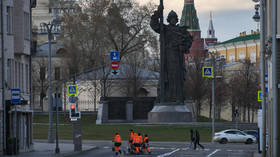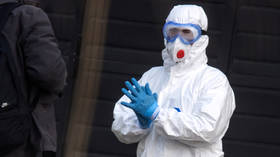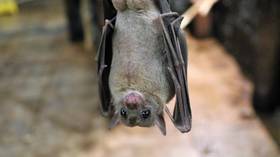Covid-19 quarantine could cost Russia $242 BILLION as oil price fall starts to hit budget income
There are storms, and there are ‘perfect storms.’ Just days after negotiations between Russia, the US and Saudi Arabia led to a deal on crude output, there are clear signs of more turbulent seas ahead.
According to Russian economists, the financial damage caused by measures to contain the coronavirus pandemic could amount to 17.9 trillion rubles ($242 billion). Meanwhile, 15.5 million people may find themselves out of work, from a total labor force of around 72 million. Such a figure would be astonishing in modern Russia, which has registered consistently low unemployment under the Putin and Medvedev presidencies. The jobless rate stood at only 4.2 percent in February.
The forecast from the National Rating Agency (NRA) was reported on Thursday by Moscow daily Izvestia. It predicts that the service sector will be devastated by the crisis, but that agriculture, fisheries and food production will be the least affected. The NRA also believes GDP will fall by three percent, with the ruble sustaining further losses against the US dollar.
While undoubtedly painful, it’s worth noting that a three percent economic contraction would be considerably better than the scenarios facing many other European countries. For instance, Britain’s Office for Budget Responsibility has warned of a 13 percent collapse in the United Kingdom’s GDP this year.
Meanwhile, news agency Bloomberg has estimated that Russia’s coffers “will get less than $1” for each exported barrel of oil next month. Based on data from the Finance Ministry, it calculates that “oil export duty in May is set to tumble by 87 percent, compared to April, reflecting crude’s biggest crash in a generation.” The Russian government relies on oil and gas for around 40 percent of its total revenues and the timing couldn’t be worse, with huge spending needed to prop up an economy partially shut down to prevent the spread of Covid-19.
While the oil production deal has stabilized the market, the problem now is a lack of demand. The International Energy Agency states there is “no feasible agreement that could cut supply by enough” to dampen its effects, given how much of the world is presently operating at reduced capacity. Luckily for Moscow, it has a considerable financial cushion to keep it motoring along for some time – its massive foreign reserves, worth over $550 billion. There is also a “rainy day” contingency fund stuffed with around $125 billion, which can be drawn down and used during this crisis.
Quite a bit of it will likely be needed. The value of clothes and shoes production in Russia will decline by a whopping 52 percent, says the NRA, with the entertainment, sports and leisure categories looking at a 46 percent wipeout in value. Overall, the exchequer is facing the loss of around 4.2 trillion rubles ($56 billion) in taxes, fees and social insurance revenue.
So far, the government has allocated two trillion rubles ($27 billion) in economic supports. But Sergey Grishunin, head of the NRA’s rating service, argues it’s only the tip of the iceberg. “In our opinion, this assistance is ‘emergency.’ It is able to solve current and urgent tasks and help enterprises stay afloat, but these measures will not contribute to the rapid recovery of the economy after quarantine,” he said.
The government’s measures to keep the economy alive include credit holidays and deferred tax payments – as well as providing cash to struggling industries like aviation. President Vladimir Putin has already announced a 23 billion ruble ($311 million) emergency support plan for the embattled sector.
“The authorities understand the need for such assistance,” Grishunin pointed out. “On Wednesday, the president proposed a whole range of additional measures to support industries and citizens, including allocating money to businesses for paying salaries to employees and urgent needs, providing guarantees for interest-free salary loans, providing direct assistance to regions, as well as soft loans to enterprises for replenishing working capital funds.”
Also on rt.com How Western media colludes with tiny Navalny-linked group of doctors to weaponize Russia’s Covid-19 battleHowever, Grishunin also warns that support carries its own risks. “In conditions of low oil prices and economic sanctions, significant spending of [financial] reserves will lead to a weakening of the financial stability of the Russian economy. As a result, [there will be] an increase in the exposure of the Russian economy to future economic shocks,” he added.
Think your friends would be interested? Share this story!















